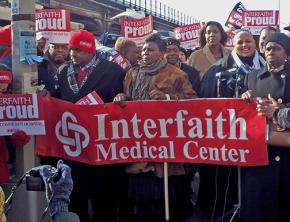We won’t let Interfaith close
reports on the ongoing struggle to keep a Brooklyn hospital open.
DOZENS OF workers at Interfaith Medical Center in Brooklyn occupied their workplace January 17 to protest an announcement that the hospital would no longer accept patients dropped off by ambulances.
The order to refuse ambulance drop-offs was issued by Interfaith Medical Center CEO Patrick Sullivan because New York state refused to disburse $3.5 million promised in December so that Interfaith could continue operations.
In response to the occupation, a "frightened" Sullivan locked himself in his office to keep out chanting protesters and called the police, according to a hospital spokesperson. When officers arrived, they accompanied one delegate designated by protesters inside Sullivan's office.
The delegate demanded that the order prohibiting acceptance of ambulances be rescinded immediately. Sullivan was adamant that without state money, the hospital could not safely accept additional patients. According to Sharonnie Perry, chairperson of the hospital's community advisory board, Sullivan said, "Tell them to fire me!" About three hours after the sit-down began, police escorted Sullivan out of the hospital while workers celebrated his departure.

It was later discovered that Sullivan had submitted his resignation to the hospital board on January 2, effective at the end of the month. The hospital's chief medical officer was appointed acting chief executive--and reinstated full emergency services at the hospital later in the day.
Interfaith Medical Center, which primarily serves poor residents of Brooklyn's Bedford-Stuyvesant and Crown Heights neighborhoods, filed for bankruptcy protection a year ago.
In early January, the Dormitory Authority of New York state--an agency involved in state education and health care--notified the hospital that it would keep funds allocated by the state Department of Health in late December, as well as $4 million in Vital Access Provider (VAP) funding also owed to Interfaith. VAP funding is allocated to ensure patient access to providers' services that are otherwise jeopardized.
According to the state, the decision to withhold the funds was due to the decision by Interfaith's board not to transfer its clinic services to another Brooklyn provider, Kingsbrook Jewish Medical Center. Interfaith's board insists that the plan to transfer clinic services was contingent on Interfaith's planned closure, which was no longer necessary because the new funds would enable it to stay open.
CHANTING "HEY! Hey! What do you say? Interfaith is here to stay!" hospital workers and supporters gathered at a press conference on January 19 to demand the release of those funds.
Two days after the press conference, the struggle continued with a gathering of protesters in front of U.S. District Bankruptcy Court during a hearing on the Interfaith Medical Center's case. Supporters braved the snow to champion the cause of both Interfaith and Long Island College Hospital, another Brooklyn hospital facing similar attacks and struggling for survival.
"They're basically holding [Interfaith] hostage because the board refused to sell its parts," said Public Advocate Letitia James at the press conference, referring to the state's decision to withhold funds. "I'm calling upon Gov. Cuomo, the Dormitory Authority and the Department of Health to witness the fact that we're overcapacity, to witness the fact that a significant number of individuals in Crown Heights, in Bed-Stuy and Central Brooklyn rely on this hospital. And to say, release the money."
Perry, the hospital's community board adviser, spoke defiantly about recent developments at the hospital and workers' intention to keep up their struggle against the continued threats to close it, "We stand here in solidarity with 1199, NYSNA [New York State Nurses Association], the workers of Interfaith and elected officials," Perry said. "Friday [the day of the sit-in] was just the beginning of what's about to happen here in this community...There is no stopping us now."
As the press conference concluded, a rendition of the civil rights-era play The Death of Bessie Smith was starting in the hospital's conference room. The New Brooklyn Theater is producing the Edward Albee play, which is set in the early the 20th century and tells the story of Bessie Smith, an African American blues singer denied care at a whites-only hospital after a severe car accident.
The New Brooklyn Theater and the unpaid actors involved in the show view this production as an instrument for raising consciousness about the community hospital, and the political and racial issues that swirl around the effort to close it.
Though Interfaith remains open, it currently has only enough funding to meet payroll for one week. The dozens who occupied the hospital are just a few of the hospital's 2,700 workers--1,500 of whom are full-time and stand to lose their jobs if the shutdown takes place.
Charmayne Sadler-Walker, a registered nurse and NYSNA member who has worked at Interfaith for five years, said that the occupation and press conference were an important part of their struggle.
"We needed to let the wider public and the powers that be know that Interfaith is filled to capacity and is a functional institution," she said. When asked what she expects will happen in the coming week, Sadler-Walker said she hopes for a "12th hour miracle."
When Sharonnie Perry was asked what would happen if the funds are not released to sustain the hospital, she said, "We're going to occupy Interfaith."


